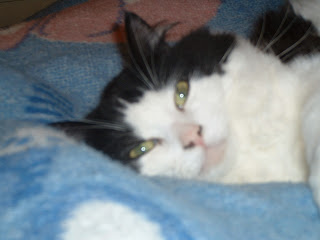
Dear Spike:
In preparation for your arrival, I’ve been working from home in the mornings — mostly upstairs in my office. Today, however, I couldn’t even get out of my bed.
Coltrane was always a cat that liked to cuddle, but ever since Emma died he’s been downright needy. This morning he was sprawled out on my chest, head tucked into the crook of my arm as I balanced my computer on my thighs so that I could see the screen over his body. It wasn’t the most conducive environment for getting work done, but he looked so very comfortable and content, I just couldn’t bear to move him.
At first I thought your mother and I were simply projecting our own emotions onto Cole, following Emma’s death. We felt sad, so we assumed he was sad. We felt lonely so we assumed he was lonely. That’s something pet owners do a lot.
But while we were away in California, this week, I had my friends come by to check on Cole, as they have done many times in the past. And they noticed the change, too.
“He just wouldn’t let us leave,” my buddy Matt told me. “He just wanted so much attention.”
Other than the obvious — simply spending more time cuddling and petting Cole — I don’t know what I can do for him. After all, it’s not like we can sit down and chat about his needs.
That, of course, has gotten me thinking about how I’ll know what you need, once you arrive. It will be some time, after all, until we can sit down and chat about your needs.
I’ve heard other parents say they learn to recognize their children’s cries — perhaps a certain octave means ‘I’m wet,’ a certain tone means ‘I’m hungry,’ and a certain pattern means ‘I’m cold.’
I’m not sure there’s any science backing it up, but I’m not about to knock it until I know. Besides, I like the idea that there may be some small way in which we you will be able to communicate your needs with me, early on.
Later on, we’ll try sign language — a trend that’s quite en vogue, at the moment. If it works you’ll be able to tell us, months before you can talk, that you want a certain toy, a bottle, some food or a warm blanket.
But what about those times before I know your cries and before you can squeeze your hands (as if milking a tiny invisible cow) to tell me it’s time for lunch? How will I know what you want? What if I change you when I need to be feeding you and I feed you when I need to be putting you down for a nap? What if I wrap you in a blanket when you really need to cool down and I sing you a song when you really just need a few moments of silence?
I do think parents (like pet owners) can overanalyze how to best meet their children’s needs — and they often worry needlessly about what might happen, years down the road, if they don’t...
“Well, Your Honor, it’s like this: Spike was a good kid — a real good kid — but her dad just didn’t understand that she needed mashed carrots, not peas, when she was an infant. That’s why my client’s here before you today.
You see, the way I see it, there are two victims here. Of course Mr. Smith didn’t deserve to be run down in the parking lot of that Burger King, but is he the only victim? I submit to you that he is not.
Carrots, Your Honor. All she needed was a few bites of carrots.”
So I suppose I’m not worried about the long-term consequences of mistaking an “I’m hungry” cry with a “my socks are bunched up around my ankles and it’s bugging the heck out of me” cry. And yet, I really want to know — not because I think you’ll wind up on turning tricks on State Street if I don’t, but because I simply want to make you happy.
Until we can chat about it (and sometimes even after that) I suppose I’ll just have to guess.
And in the meantime, like Coltrane, I’ll just hold you a lot. That may not always be exactly what you need, but it’s probably never a bad alternative.
Love,
dad